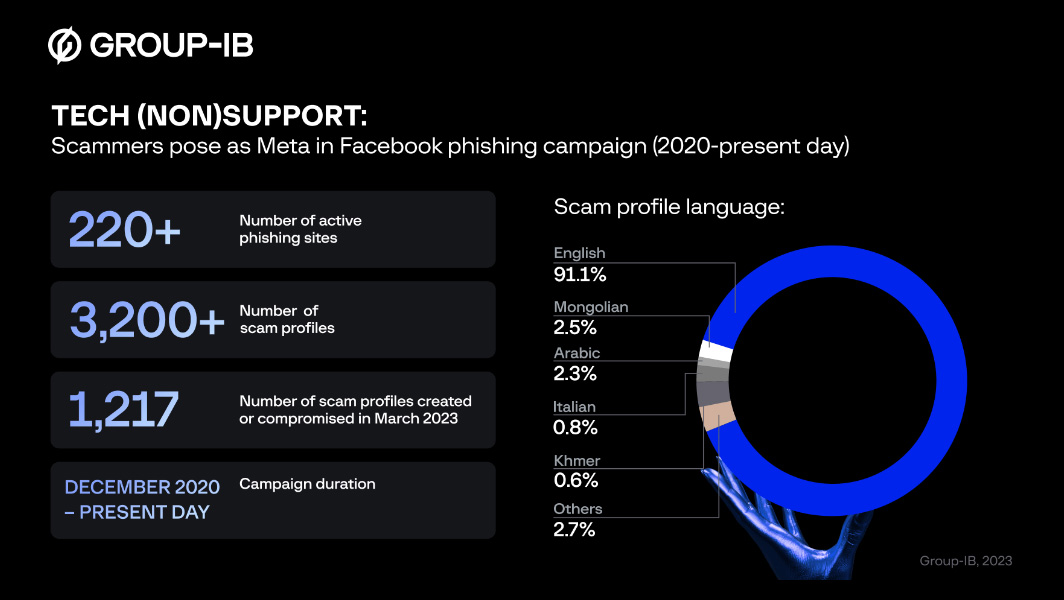News
Facebook Scammers Pose As Support Staff On 3,200 Fake Profiles
A leading cybersecurity firm’s Dubai-based team uncovered a widespread scam targeting celebrities, businesses, sports teams, and individual accounts.

Global cybersecurity experts Group-IB today published new research into a worldwide phishing campaign carried out on Facebook by cybercriminals impersonating Meta (Facebook’s parent company) support staff.
Between February and March 2023, Group-IB researchers based in Dubai identified over 3,200 Facebook profiles falsely claiming to be written by Meta support staff in over 20 languages. Upon discovering the scammers’ accounts, Group-IB’s Computer Emergency Response Team shared information with Facebook, which it must be noted had already deleted some of the offending profiles.

The cybercriminals’ goal was to hack the Facebook accounts of public figures and celebrities, businesses, sports teams, and individual accounts. As part of the elaborate scam, cookie data, and session hijacking were employed, though the criminals mostly used traditional phishing techniques to trick people into voluntarily entering email and password information.
Group-IB researchers began tracking this widespread scam in February 2023. As well as 3,200 fake Facebook profiles containing scam posts, the cybersecurity experts also discovered 220 websites intended to trick users into parting with their data.
The Details Of The Scam
This Facebook scammers used social engineering techniques to trick users into thinking their accounts were marked for suspension due to copyright violations. If victims attempted to verify their profile to prevent it from being blocked, they would be taken to a phishing website, where they were presented with a page that contained official-looking Meta or Facebook branding.
Also Read: Filmmaker Uses AI To Visualize Thousands Of Leaked Passwords
“Cybercriminals can use compromised accounts to launch further phishing attacks. Individuals can suffer legal and reputational damage [and] threat actors could also gain access to the victim’s financial services [and] hold compromised accounts for ransom, demanding payment from the victim for retrieval of the account,” says Sharef Hlal, Head of Group-IB’s Digital Risk Protection Analytics Team.
Group-IB recommends social network users ensure that their passwords are “strong and unique, and that they enable two-factor authentication (2FA) to provide an extra layer of security”. In addition, if you’re ever directed away from official social media platform pages, it’s a good idea to closely check the URL to ensure it’s legitimate.
News
Samsung Smart Glasses Teased For January, Software Reveal Imminent
According to Korean sources, the new wearable will launch alongside the Galaxy S25, with the accompanying software platform unveiled this December.

Samsung appears poised to introduce its highly anticipated smart glasses in January 2025, alongside the launch of the Galaxy S25. According to sources in Korea, the company will first reveal the accompanying software platform later this month.
As per a report from Yonhap News, Samsung’s unveiling strategy for the smart glasses echoes its approach with the Galaxy Ring earlier this year. The January showcase won’t constitute a full product launch but will likely feature teaser visuals at the Galaxy S25 event. A more detailed rollout could follow in subsequent months.
Just in: Samsung is set to unveil a prototype of its augmented reality (AR) glasses, currently in development, during the Galaxy S25 Unpacked event early next year, likely in the form of videos or images.
Additionally, prior to revealing the prototype, Samsung plans to introduce…
— Jukanlosreve (@Jukanlosreve) December 3, 2024
The Galaxy Ring, for example, debuted in January via a short presentation during Samsung’s Unpacked event. The full product unveiling came later at MWC in February, and the final release followed in July. Samsung seems to be adopting a similar phased approach with its smart glasses, which are expected to hit the market in the third quarter of 2025.
A Collaborative Software Effort
Samsung’s partnership with Google has played a key role in developing the smart glasses’ software. This collaboration was first announced in February 2023, with the device set to run on an Android-based platform. In July, the companies reiterated their plans to deliver an extended reality (XR) platform by the end of the year. The software specifics for the XR device are expected to be unveiled before the end of December.
Reports suggest that the smart glasses will resemble Ray-Ban Meta smart glasses in functionality. They won’t include a display but will weigh approximately 50 grams, emphasizing a lightweight, user-friendly design.
Feature Set And Compatibility
The glasses are rumored to integrate Google’s Gemini technology, alongside features like gesture recognition and potential payment capabilities. Samsung aims to create a seamless user experience by integrating the glasses with its broader Galaxy ecosystem, starting with the Galaxy S25, slated for release on January 22.


























